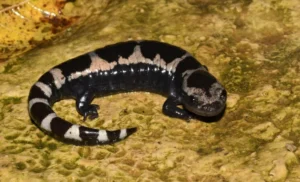Salamanders are really interesting amphibians with unusual habits and cool biology. Lots of people want to keep them as pets. But if you live in California, you might wonder if it’s even allowed. The state has strict rules to protect wildlife and the environment, which can affect what animals you are allowed to keep.
In California, owning native salamanders is usually not allowed without a special permit. Non-native salamanders may be okay if they are born in captivity and follow state rules. Still, the laws are strict and tricky, so doing your homework and following the rules is very important.
The state wants to stop illegal collecting, disease, and damage to the environment from pets that get released. This means salamander ownership is controlled closely.
If you think about keeping a salamander in California, knowing the rules and how to care for them properly helps you stay out of trouble and keep both your pet and the environment safe.
California’s Native Salamanders and Their Protection
California has lots of native salamanders, like the California slender salamander, arboreal salamanders, and the California tiger salamander. Many of them live in sensitive places, such as forests, wetlands, or mountains.

Because of lost homes, pollution, and non-native animals, some salamanders are at risk or in danger. For example, the California tiger salamander is one of the salamanders that’s in danger of disappearing.
To protect native salamanders, California law:
- Prohibits collecting or possessing wild native salamanders without a permit
- Restricts sale or transport of native species
- Enforces penalties for illegal capture or trade
These rules help keep wild salamanders safe and protect their environment. Taking salamanders from the wild can make their numbers drop and mess up the ecosystem.
Permits Required for Native Salamanders
To legally keep native salamanders in California, you need a permit from the California Department of Fish and Wildlife (CDFW).
Permits are usually only given for:
- Scientific research
- Educational purposes
- Conservation breeding programs
Getting a permit for keeping a native salamander as a pet is very rare and hard to get.
The CDFW checks every application carefully to make sure keeping salamanders won’t harm wild populations or spread disease.
Without a permit, having native salamanders is illegal and can get you fines, confiscation, or other legal trouble.
What About Non-Native Salamanders?
California’s rules mostly protect native wildlife. But non-native species, like tiger salamanders from other states or axolotls from Mexico, may be okay under certain rules.
To keep a non-native salamander legally, you usually must:
- Buy captive-bred animals from licensed breeders or dealers
- Follow state rules for exotic pet ownership
- Never release salamanders into the wild
Some non-native salamanders can carry diseases that hurt native amphibians. California does not allow releasing or letting exotic amphibians escape to protect the environment.

Before getting a non-native salamander, check with the CDFW and local animal control to make sure the species is allowed and you have the needed permits.
Disease Risks and Regulations
Amphibians all over the world can get sick from diseases like chytridiomycosis, which is caused by chytrid fungus. This disease has killed a lot of amphibians everywhere.
California’s rules try to stop diseases from spreading through pets and their release. To do this:
- Transport and sale of amphibians are watched closely
- Importing some species is banned
- Owners are encouraged to keep things clean and contained
If salamanders escape or are released, they can bring germs that hurt native amphibians. The state strongly warns against releasing pets.
Using proper quarantine, cleaning, and careful care lowers disease risks and helps protect California’s amphibians.
Can You Buy Salamanders in California Pet Stores?
Some pet stores sell captive-bred salamanders, especially popular ones like axolotls. What’s available depends on local laws and store rules.
Before buying, check:
- If the store follows legal rules
- Whether the species is allowed where you live
- If salamanders are captive-bred, healthy, and well cared for
Good sellers give care instructions and do not sell wild-caught animals. Buying from licensed breeders lowers the risk of illegal trade and disease.

Always ask for proof and do your homework before buying.
Responsible Ownership in California
If you are allowed to keep a salamander, taking care of it properly is very important. This includes:
- Giving a proper home with the right humidity, temperature, and hiding spots
- Feeding live insects or other suitable food
- Keeping the enclosure secure so they don’t escape
- Never releasing pets into the wild
Salamanders are sensitive animals. Poor care can make them sick or even die. Escaped pets can hurt native animals and the environment.
Owning a salamander is a serious commitment. You need knowledge, patience, and respect for the animal and its environment.
What If You Find a Salamander in California?
If you find a salamander outside or inside your home, it’s usually a protected native species. Don’t try to keep it as a pet or move it without permission.
Instead:
- Watch from a distance and enjoy seeing it
- Avoid handling it unless needed, and use wet hands or gloves
- Contact wildlife authorities if it’s hurt or trapped
- Never release captive salamanders or non-native species into the wild
Helping salamanders means protecting their homes and following the law.
Conclusion
Owning a salamander in California is controlled to protect native species and the environment. Non-native salamanders may be kept legally under some rules, but native salamanders usually need permits.
Before buying or adopting a salamander in California, check the laws and talk to the California Department of Fish and Wildlife.
Taking care of salamanders responsibly means giving proper care and never releasing pets into the wild.
Hi, my name is Ezra Mushala, i have been interested animals all my life. I am the main author and editor here at snakeinformer.com.

